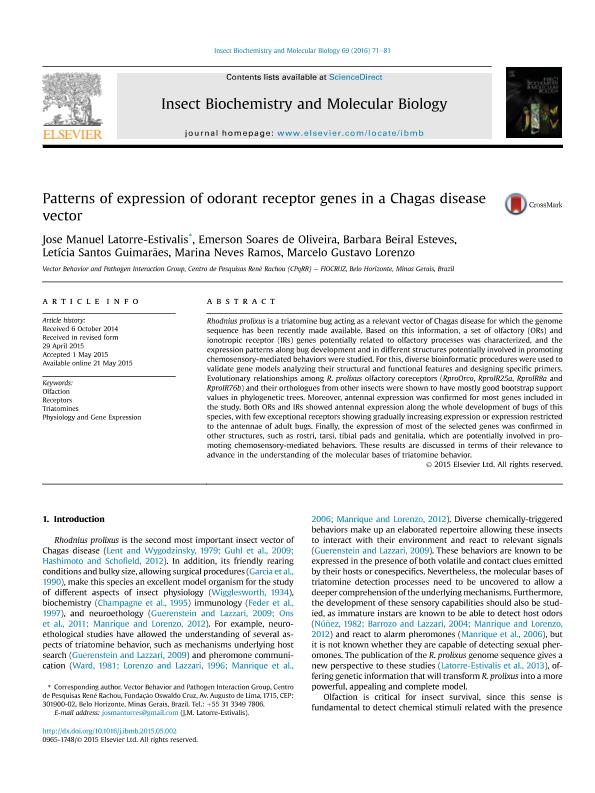Artículo
Patterns of expression of odorant receptor genes in a Chagas disease vector
Latorre Estivalis, Jose Manuel ; de Oliveira, Emerson Soares; Beiral Esteves, Barbara; Santos Guimarães, Letícia; Neves Ramos, Marina; Lorenzo, Marcelo Gustavo
; de Oliveira, Emerson Soares; Beiral Esteves, Barbara; Santos Guimarães, Letícia; Neves Ramos, Marina; Lorenzo, Marcelo Gustavo
 ; de Oliveira, Emerson Soares; Beiral Esteves, Barbara; Santos Guimarães, Letícia; Neves Ramos, Marina; Lorenzo, Marcelo Gustavo
; de Oliveira, Emerson Soares; Beiral Esteves, Barbara; Santos Guimarães, Letícia; Neves Ramos, Marina; Lorenzo, Marcelo Gustavo
Fecha de publicación:
02/2016
Editorial:
Pergamon-Elsevier Science Ltd
Revista:
Insect Biochemistry And Molecular Biology
ISSN:
0965-1748
Idioma:
Inglés
Tipo de recurso:
Artículo publicado
Clasificación temática:
Resumen
Rhodnius prolixus is a triatomine bug acting as a relevant vector of Chagas disease for which the genome sequence has been recently made available. Based on this information, a set of olfactory (ORs) and ionotropic receptor (IRs) genes potentially related to olfactory processes was characterized, and the expression patterns along bug development and in different structures potentially involved in promoting chemosensory-mediated behaviors were studied. For this, diverse bioinformatic procedures were used to validate gene models analyzing their structural and functional features and designing specific primers. Evolutionary relationships among R. prolixus olfactory coreceptors (RproOrco, RproIR25a, RproIR8a and RproIR76b) and their orthologues from other insects were shown to have mostly good bootstrap support values in phylogenetic trees. Moreover, antennal expression was confirmed for most genes included in the study. Both ORs and IRs showed antennal expression along the whole development of bugs of this species, with few exceptional receptors showing gradually increasing expression or expression restricted to the antennae of adult bugs. Finally, the expression of most of the selected genes was confirmed in other structures, such as rostri, tarsi, tibial pads and genitalia, which are potentially involved in promoting chemosensory-mediated behaviors. These results are discussed in terms of their relevance to advance in the understanding of the molecular bases of triatomine behavior.
Palabras clave:
Olfaction
,
Physiology And Gene Expression
,
Receptors
,
Triatomines
Archivos asociados
Licencia
Identificadores
Colecciones
Articulos(CCT - LA PLATA)
Articulos de CTRO.CIENTIFICO TECNOL.CONICET - LA PLATA
Articulos de CTRO.CIENTIFICO TECNOL.CONICET - LA PLATA
Citación
Latorre Estivalis, Jose Manuel; de Oliveira, Emerson Soares; Beiral Esteves, Barbara; Santos Guimarães, Letícia; Neves Ramos, Marina; et al.; Patterns of expression of odorant receptor genes in a Chagas disease vector; Pergamon-Elsevier Science Ltd; Insect Biochemistry And Molecular Biology; 69; 2-2016; 71-81
Compartir
Altmétricas



